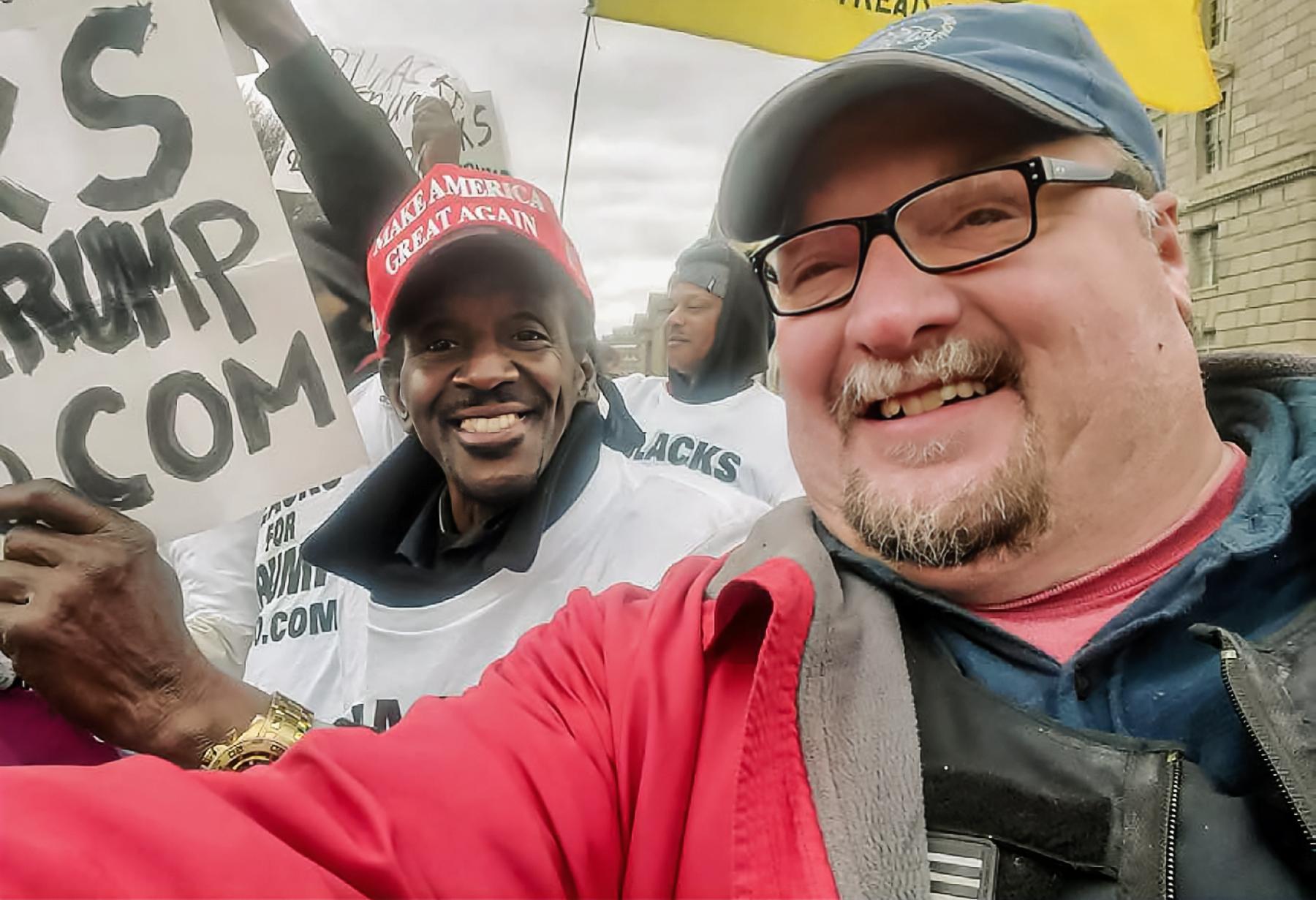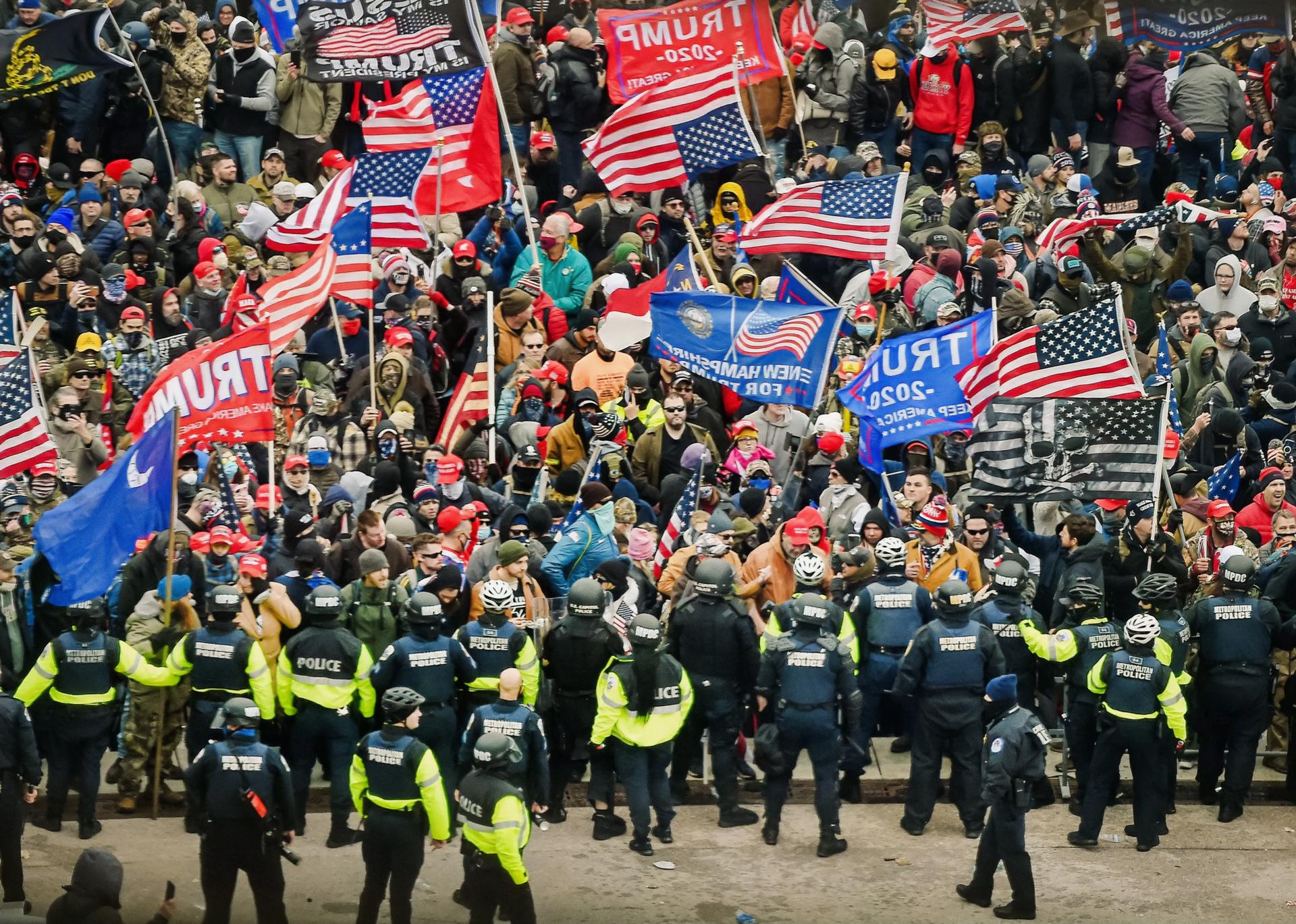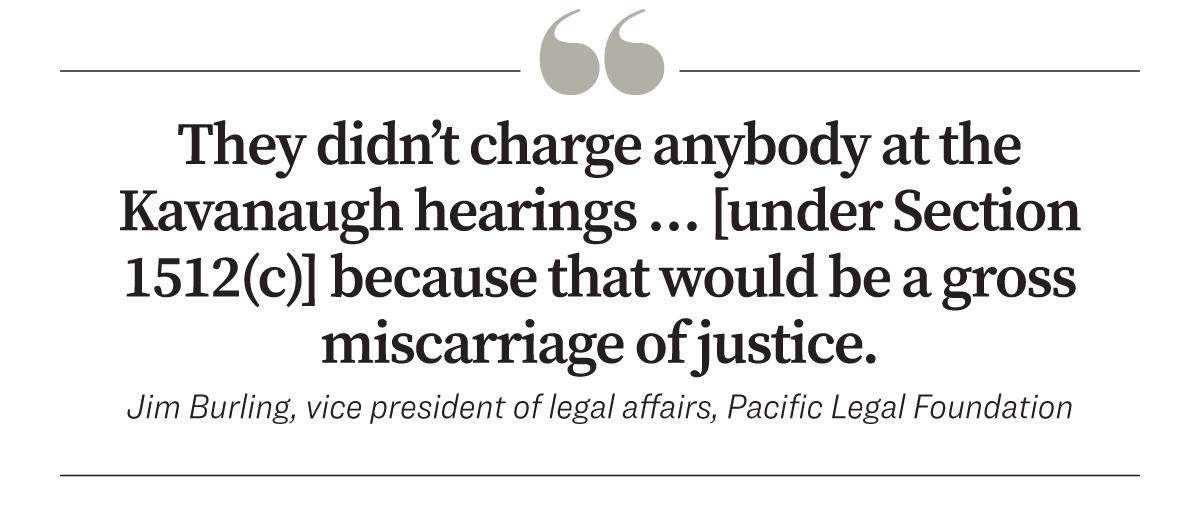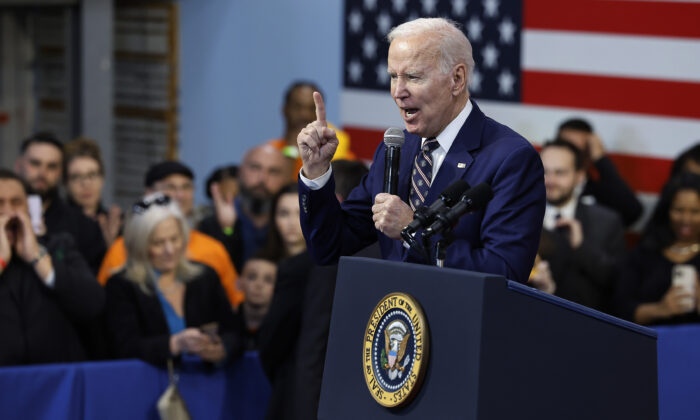Hundreds of cases, including Trump’s, will be affected if the top court strikes down the government’s use of an ‘obstructing an official proceeding’ charge.
The Supreme Court will strike down the use of a key federal law in the Biden administration’s ongoing prosecutions of Jan. 6 defendants and in the process shut down the government’s case against hundreds of defendants, legal experts predict.

If the top court finds an Enron-era obstruction law—18 U.S. Code Section 1512(c)—is being used improperly against the defendants, their charges are likely to be thrown out.
At issue is the evidence-tampering provision that appears in the Corporate and Criminal Fraud Accountability Act of 2002, which was part of the Sarbanes-Oxley Act aimed at curbing wrongdoing on Wall Street.
President Trump was indicted under the same federal statute and also stands to benefit if the Supreme Court rules in favor of the defendant, sources told The Epoch Times.
Former police officer Joseph W. Fischer of Jonestown, Pennsylvania, is the main defendant in the case that revolves around protesting the impending congressional certification of the 2020 presidential election results at the U.S. Capitol.
Mr. Fischer was indicted two months after the Jan. 6 breach for obstructing an official proceeding; civil disorder; assaulting, resisting, or impeding officers; entering and remaining in a restricted building or grounds; disorderly and disruptive conduct in a restricted building or grounds; disorderly conduct; and parading, demonstrating, or picketing in a Capitol building.
He entered not guilty pleas to the charges.
The Supreme Court agreed on Dec. 13, 2023, to hear Fischer v. United States but oral arguments have not yet been scheduled.
Some defendants who arrived at the Capitol after Congress was evacuated on Jan. 6 were also charged with obstructing an official proceeding—the joint session of Congress that convened to count Electoral College votes and hear objections from lawmakers.
Several defendants have argued unsuccessfully at trial that they couldn’t have obstructed Congress because they weren’t present in the Capitol until after lawmakers left the complex.

Obstruction Charge
The problem with the obstruction charge, according to attorneys interviewed by The Epoch Times, is that the accounting reform law under which Mr. Fischer and others have been charged, is being used by the Department of Justice to prosecute people who were exercising their First Amendment right to protest the congressional certification of election results.
The Sarbanes-Oxley legislation came about in the wake of fraud-related scandals at Enron Corp. and other major corporations. Enron employed dubious accounting practices to conceal falling profits and exaggerate earnings, and reportedly began destroying paperwork when they learned that indictments were on their way.
The bill was overwhelmingly approved by Congress and signed into law by President George W. Bush on July 30, 2002.
“No more easy money for corporate criminals, just hard time,” President Bush said when he signed the bill. “The era of low standards and false profits is over. No boardroom in America is above or beyond the law.”

The wording of 18 U.S. Code Section 1512(c) is focused on documentation and ensuring it’s made available for official proceedings, lawyers say.
Section 1512(c) states: “Whoever corruptly (1) alters, destroys, mutilates, or conceals a record, document, or other object, or attempts to do so, with the intent to impair the object’s integrity or availability for use in an official proceeding; or (2) otherwise obstructs, influences, or impedes any official proceeding or attempts to do so, shall be fined under this title or imprisoned not more than 20 years, or both.”
‘Utterly Absurd’
It is “utterly absurd” for the Biden administration to charge Jan. 6 protesters with a crime that carries a 20-year prison term, said Jim Burling, vice president of legal affairs for the Pacific Legal Foundation (PLF). PLF is a national nonprofit public interest law firm that challenges government abuses.

“The Department of Justice should get an award for creativity and … [for] how they’ve come up with ways of using Sarbanes-Oxley well beyond what anybody ever thought it would be [used for].”
There are “so many statutes that are so vague these days that the Department of Justice often brings charges against people for things—that you have no idea that it’s supposedly criminal conduct, because Congress didn’t intend it to be criminal conduct.”
The department has been “notorious” over the years for overcharging people and “going for the brass ring when they could have a much more secure conviction on lesser charges,” Mr. Burling said.
The purpose of threatening a defendant with 20 years in prison “is to get people to capitulate—plead guilty” and many of the Jan. 6 defendants have already done so, he said.

Mr. Burling said the Justice Department is taking the section of the law that says “‘otherwise obstructs,’ and having it as a free-floating provision where anybody who otherwise obstructs any official proceeding, or attempts to do so can be subject to 20 years.”
“I think both the liberals and the conservatives on the Supreme Court are going to be very wary of this overcharging,” he said.
“Sarbanes-Oxley is a powerful tool against corporate corruption. That’s what … it was meant to be for, and that’s what the plain language of the statute talks about. You can’t simply separate these two sections out—section one and section two of 1512(c)—and pretend they’re completely different things.”
“The idea that section one is untethered from section two is rather creative, and I don’t think it’s going to hold water,” Mr. Burling said.
“I just don’t think the Supreme Court is going to go along with that, just like they put a kibosh on the charging of the fisherman in the Yates case … because he threw the allegedly undersized fish overboard.”
Mr. Burling was referring to Yates v. United States (2015) in which the Supreme Court threw out charges under Section 1519 of Sarbanes-Oxley against a fishing boat captain who disposed of evidence that undersized red groupers had been caught. A federal agent directed the captain to segregate the evidence, in this case the undersized fish, from the rest of the catch until the ship returned to port, but after the agent left the vessel the captain told his crew to toss the undersized fish overboard.
The Supreme Court held that the law pertained to records and was not intended as an across-the-board ban on the destruction of physical evidence.
In Yates, the Supreme Court said, “‘No, you cannot say Sarbanes-Oxley applies to somebody tossing fish overboard. That just goes too far. It’s not what was intended by the statute.’”
Mr. Burling predicts the court will apply the same kind of reasoning to Mr. Fischer’s case.
Wrong Statute
Criminal defense attorney and former deputy district attorney David Gelman of Gelman Law in Cherry Hill, New Jersey, said Section 1512(c) doesn’t apply to the actions of Mr. Fischer and other Jan. 6 codefendants.
“These individuals are being charged with obstructing and attempting to obstruct official proceedings by going into the Capitol building, and walking around – that is not an obstruction,” Mr. Gelman said.
Mr. Fischer’s evidence shows that “he was literally in the Capitol for I think it was five or six minutes walking around and [then] leaving. At no time did he obstruct any proceeding or destroy any evidence or try to obstruct any type of official vote for the presidency.
“Most of these individuals who were charged with that acted in the same way as Fischer, so I don’t see how they were charged with this particular crime under the statute,” Mr. Gelman said.
“I think the Supreme Court is actually going to rule in favor of Fischer and the other co-defendants in the January 6 matter.”

Veteran Supreme Court observer Curt Levey, president of the conservative Committee for Justice, said the Sarbanes-Oxley provision used against Mr. Fischer “is incredibly inapplicable here.”
“Nobody would have dreamed it would be applied to protests that got out of control at the Capitol,” he said.
“There’s virtually no chance that the Supreme Court will say that the provision applies to the January 6 protesters.” “I do think they’re going to throw this [prosecution] out.”.
In recent years the Supreme Court has “looked askance” at the “incredibly broad interpretation of federal criminal statutes, especially to criminalize political activity,” Mr. Levey said, citing the court’s ruling in the case of former Virginia Gov. Bob McDonnell and the Bridgegate case..
In 2016, the court reversed the federal bribery convictions a prosecutor secured against Mr. McDonnell, a Republican. He was convicted of receiving improper gifts and loans from a donor, but the Supreme Court unanimously threw out the convictions because there was no evidence the governor reciprocated with a quid pro quo.
In the court’s opinion, Chief Justice John Roberts criticized the prosecution for its “boundless interpretation of the federal bribery statute.”
And in 2020 the court threw out convictions in the Bridgegate case that arose out of a political scandal in which no money or political favors changed hands. In the saga, two former New Jersey political operatives orchestrated traffic congestion at the George Washington Bridge to punish a local politician.

Mr. Burling said if the government’s rationale for using the Sarbanes-Oxley provision against Mr. Fischer stands, it could open the door to disturbing government abuses.
For example, he noted that there were many people at the 2018 confirmation hearing for Supreme Court Justice Brett Kavanaugh who kept standing up and shouting to obstruct the proceedings. But instead of being charged under Section 1512(c), they faced minor charges such as disorderly conduct and fines of around $50, Mr. Burling said.
“So what the Department of Justice is saying with these Sarbanes-Oxley prosecutions of the January 6 demonstrators … is that they could bring the same charges against any one of those people that was at the Kavanaugh hearings,” he said. “Of course, they didn’t charge anybody at the Kavanaugh hearings … [under Section 1512(c)] because that would be a gross miscarriage of justice.

“We have protesters that try to break in and shout and make noise and that kind of thing [all the time]. Are we going to be charging everybody who protests government with [a crime that could lead to] 20 years [in prison]?” Mr. Burling said.
“I certainly hope not, because that would be … the sort of thing you would expect more out of Vladimir Putin, not the United States government.”
Effect on Trump and Jan. 6 Prosecutions
Mr. Gelman said if the Supreme Court finds the Section 1512(c) prosecutions unlawful, “once that happens, I think that’s going to be like a rolling cascade because what will happen then is individuals that were already sentenced—their cases are going to have to be reopened under that particular charge.”
Some of the charges brought by special counsel Jack Smith against President Trump under Section 1512(c) “will have to go away.”
A ruling for Mr. Fischer “would really kill Jack Smith’s case against President Trump,” Mr. Gelman said.
Mr. Levey said the Supreme Court’s ruling on Section 1512(c) “probably will be of help to the January 6 protesters but I’m not sure how much help it will be to” President Trump who would still face other charges and must still face the voters in the 2024 election.
“At the end of the day, Jack Smith is still going to get his show trial, and perhaps even a conviction. And I think the other charges will probably be thrown out ultimately by the Supreme Court as well. But that’s not going to happen before the November election.”
Joseph M. Hanneman contributed to this article.


